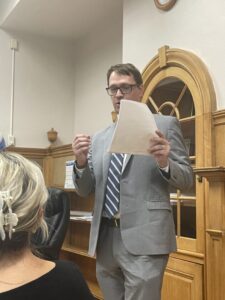Hochul’s Agenda A Loser In One-House Budgets
Gov. Kathy Hochul’s 2022 agenda lies in tatters after Democrats in the state Assembly and Senate hacked it to pieces.
What’s out?
Changes to bail reform are, for now, not happening. Neither is a plan to lift the cap on charter schools in New York City. Hochul’s housing compact requiring a 5% growth in housing in municipalities across the state has been thrown overboard by legislators, though overwhelming opposition from city, town and village officials across the state made that choice easy. Also easy due to overwhelming opposition from counties was eliminating Hochul’s attempt to keep Medicaid funding earmarked for counties and apply it instead to the state’s Mediciad budget.
Speaking just as loudly as the Hochul agenda items stripped from the budget are items legislators have included in their one-house budgets. The state Senate is supporting good-cause evictions while the state Assembly is supporting finding ways to protect tenants from rent increases and unnecessary evictions. A housing access voucher opposed by Hochul in the past has been included in both houses’ budgets.
Both houses also rejected Hochul’s ban on flavored tobacco products, though legislators did keep Hochul’s proposed $1 a pack tax on cigarettes, hiking the state’s tax from $4.35 a pack to $5.35 a pack.
Nowhere is the chasm between the sides shown more clearly than bail reform.
A late February poll by Siena College showed 36% of voters said crime should be Albany’s top priority, followed by the cost of living (27%) and affordable housing (13%). The poll found 92% of state voters polled said crime is the most serious problem across the state while two-thirds said it is a problem in their community.
“First, the size of someone’s bank account should not determine whether they sit in jail, or return home, before they have even been convicted of a crime,” Hochul said during her State of the State address in January. “That was the goal of bail reform. It was a righteous one, and I stand by it. Second, bail reform is not the primary driver of a national crime wave created by a convergence of factors, including the pandemic. And third, that the bail reform law as written now leaves room for improvement. As leaders, we cannot ignore that, when we hear so often from New Yorkers that crime is their top concern. And so, to my partners in the legislature, let’s start with this shared understanding and have a thoughtful conversation during the budget process about improvements we can make to the law.”
But during a rally earlier this week, legislative Democrats and their supporters discussed a new study by John Jay College’s Data Collaborative for Justice that they said showed bail reform was working. For the most part, those released after low-level misdemeanor offenses didn’t reoffend, according to the study — and that’s what legislators are focusing on. Instead of bail reform, they pushed for good cause eviction, housing access voucher programs, unemployment bridge programs, tax increases on the state’s wealthiest residents and corporations, and increases in supportive housing programs. Legislators said they prefer providing better safety net programs and protections than rolling back bail reform.
“It may be a new year, but it is the same story,” said Assembly Member Zohran K. Mamdani, D-Queens. “Once again, Governor Hochul wants to roll back bail reform, put more poor New Yorkers in jail and ignore the clear evidence that these reforms have not had any negative impact on public safety. As long as the Governor insists on fighting a battle based on fear, we will respond with a vision based on fact. We say yes to investments in real public safety, no to any bail rollbacks.”
The study found only weak support, in general that releasing more bail-eligible people either increased or decreased recidivism. But there is one group that bucked that trend; page 37 of the John Jay College report states there is a subgroup that does reoffend — those accused of violent felonies.
“The results from the two designs taken in tandem suggest that the release of bail-eligible people with recent violent felony arrests tended to increase recidivism (or certainly did not decrease it), and that releasing bail-eligible people accused of misdemeanors or nonviolent felonies and people with no prior arrests or prior (violent felony offenses) tended to decrease recidivism (or at least did not increase it),” the study states.
“The Majority has a similar lack of interest in strengthening public safety, which is New Yorkers’ number one concern,” said Sen. George Borrello, R-Sunset Bay. “To her credit, Governor Hochul has proposed repealing the “least restrictive standard” of the disastrous bail changes – one of the very worst provisions of this terrible law. The majorities have flat out rejected that proposal and have offered yet another present to New York’s criminal community by including their ‘Clean Slate Act’ in the budget, which would provide for the automatic sealing of criminal records.”
Between her failed nomination of Chief Judge Hector LaSalle and now the virtual evisceration of her legislative agenda, the big question in the room is how hard Hochul will push for her policy preferences and whether or not the state Legislature will use its supermajortiy to override the governor. In a few weeks, those questions will be answered.





